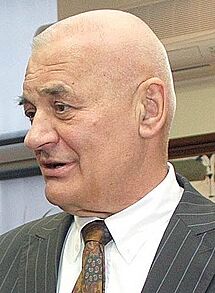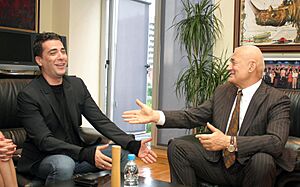Aleksandar Tijanić facts for kids
Quick facts for kids
Aleksandar Tijanić
|
|
|---|---|

Tijanić in 2012
|
|
| Minister of Information of Serbia | |
| In office 28 May 1996 – 17 December 1996 |
|
| Succeeded by | Radmila Milentijević |
| Advisor to the President of FR Yugoslavia |
|
| In office 2000–2002 |
|
| General Director of the Radio Television of Serbia |
|
| In office 18 March 2004 – 28 October 2013 |
|
| Preceded by | Aleksandar Crkvenjakov |
| Succeeded by | Nikola Mirkov |
| Personal details | |
| Born | 13 December 1949 Đakovica, PR Serbia, FPR Yugoslavia |
| Died | 28 October 2013 (aged 63) Belgrade, Serbia |
| Alma mater | University of Belgrade (no degree) |
| Occupation | Journalist, columnist |
Aleksandar Tijanić (Serbian Cyrillic: Александар Тијанић; born December 13, 1949 – died October 28, 2013) was a well-known Serbian journalist. He was also the general director of Serbia's public TV and radio company, Radio-Television of Serbia, from 2004 to 2013.
During his career, he wrote popular columns for major newspapers and magazines in Yugoslavia and Serbia. He also led several important TV stations and advised Serbian politicians. For a few months in 1996, he was the Minister of Information in the Serbian government.
Aleksandar Tijanić was a person who sparked strong opinions in Serbia. Some people greatly admired him, while others strongly disagreed with his views.
Early Life and Education
Aleksandar Tijanić was born in Đakovica, a town in what was then Yugoslavia. After finishing high school in his hometown, he moved to Belgrade. There, he started studying journalism at the University of Belgrade's Faculty of Political Sciences. However, he did not finish his university studies.
Journalism Career Highlights
In the late 1970s and early 1980s, Tijanić began his career at Politika publications. He worked his way up and eventually got a job at NIN magazine. At NIN, he first wrote about vehicles and later joined the main editorial team. This job helped him get other top editing positions.
In the mid-1980s, he became the editor-in-chief of Intervju, another weekly magazine. At the same time, he wrote for magazines in Croatia, Slovenia, and Bosnia and Herzegovina.
After a major political change in Serbia in September 1987, when Slobodan Milošević became very powerful, Tijanić lost his writing jobs in Belgrade. This meant he mostly wrote for Croatian newspapers.
He became especially famous for his political columns in the Split-based newspaper Nedjeljna Dalmacija. His writing earned him the nickname "the giant of Croatian journalism." In his column, En Passant, he often criticized the Yugoslav government and Communism. This was something many Croatian journalists didn't dare to do. His column ended in 1990 because it was seen as too critical of a new Croatian leader.

In 1991, Tijanić co-hosted a popular talk show called Umijeće življenja. The show was filmed live in front of an audience in Sarajevo and became well-known across the country. Tijanić interviewed important people, including a famous communist who disagreed with the government, Milovan Đilas. He also interviewed Stjepan Mesić, a high-ranking official from a Croatian political party. The show ended suddenly in May 1991 when a group of people caused trouble at the taping, making it unsafe for Tijanić and his co-host.
After this, Tijanić returned to Belgrade. In June 1991, he started editing the sports newspaper Sportski žurnal. In 1993, he became the head of programming for the newly launched TV Politika station.
Family Life
Aleksandar Tijanić was married. He had a son named Stefan and a daughter named Zara.
Death
Aleksandar Tijanić passed away on October 28, 2013. He died from what appeared to be a heart attack.
 | Toni Morrison |
 | Barack Obama |
 | Martin Luther King Jr. |
 | Ralph Bunche |

